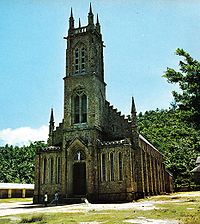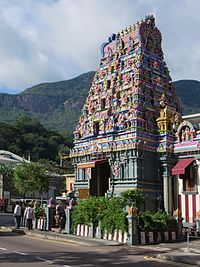| Revision as of 09:41, 22 September 2022 editDsp13 (talk | contribs)Autopatrolled, Extended confirmed users, IP block exemptions, Pending changes reviewers103,598 editsm →top: editor wlink← Previous edit | Revision as of 11:38, 28 September 2022 edit undoEmbladc (talk | contribs)Extended confirmed users815 editsm Added link to orphaned articleTag: Visual editNext edit → | ||
| Line 45: | Line 45: | ||
| Approximately 6% of Seychellois are ],<ref name="state" /> most coming from families converted by ] in the late 19th and early 20th century.<ref name=":0" /> ] churches are active and growing, among them ] and ].<ref name=":0" /> Some 5.1% of the population are adherents of other faiths, including Hinduism 2.4%, Islam 1.6%, the Baháʼí Faith and others non-Christian 1.1%.<ref name="state" /> A ] and ] exist on ].{{Fact|date=September 2021}} No restrictions are imposed on religious worship by any of the denominations,<ref name=":0" /> and tax-free status is granted by the government.{{Fact|date=September 2021}} | Approximately 6% of Seychellois are ],<ref name="state" /> most coming from families converted by ] in the late 19th and early 20th century.<ref name=":0" /> ] churches are active and growing, among them ] and ].<ref name=":0" /> Some 5.1% of the population are adherents of other faiths, including Hinduism 2.4%, Islam 1.6%, the Baháʼí Faith and others non-Christian 1.1%.<ref name="state" /> A ] and ] exist on ].{{Fact|date=September 2021}} No restrictions are imposed on religious worship by any of the denominations,<ref name=":0" /> and tax-free status is granted by the government.{{Fact|date=September 2021}} | ||
| Although the ] and the civil authorities disapprove, many Seychellois see little inconsistency between their orthodox religious observance and belief in ], ], and ].<ref name=":0" /> It is not uncommon to consult a local seer—known as a ''bonom di bwa''—for fortune-telling or to obtain protective ] or charms, called gri-gri, to bring harm to enemies.<ref name=":0" /> | Although the ] and the civil authorities disapprove, many Seychellois see little inconsistency between their orthodox ] and belief in ], ], and ].<ref name=":0" /> It is not uncommon to consult a local seer—known as a ''bonom di bwa''—for fortune-telling or to obtain protective ] or charms, called gri-gri, to bring harm to enemies.<ref name=":0" /> | ||
| ==See also== | ==See also== | ||
Revision as of 11:38, 28 September 2022
Religious Affiliation in the Seychelles (2010 Census)
Roman Catholicism (76.2%) Anglican (6.1%) Other Christian (6.9%) Hinduism (2.4%) Islam (1.6%) Other (1.1%) No religion (0.9%) Not stated (4.8%) The parish church of St. Francis at Baie Lazare
The parish church of St. Francis at Baie Lazare Hindu Temple in Victoria, Seychelles
Hindu Temple in Victoria, Seychelles
Christianity is the largest religion in Seychelles with around 89.2% of its population following it. A majority of them are Roman Catholic (76%) followed by Anglicans (6%). Hinduism is the largest minority and the largest non-Christian with 2.4% of its population following it. Other Christian groups include Baptists, Seventh-day Adventists, Assemblies of God, the Pentecostal Church, the Pentecostal Assembly, Nazarites, Eastern Orthodox Church and Jehovah's Witnesses. Islam, Baháʼí Faith and Buddhism also have sizeable number of adherents in the country.
The initial settlers in Seychelles were Roman Catholics, and the country has remained so, despite ineffective British efforts to establish Protestantism in the islands during the nineteenth century. The nation has been a bishopric since 1890, and mission schools had a virtual monopoly on education until the government took over such schools in 1944. Sunday masses are well attended, and religious holidays are celebrated throughout the nation both as opportunities for the devout to practice their faith and as social events. Practicing Catholicism, like speaking French, historically conferred a certain status by associating its adherents with the settlers from France.
Approximately 6% of Seychellois are Anglicans, most coming from families converted by missionaries in the late 19th and early 20th century. Evangelical Protestant churches are active and growing, among them Pentecostals and Seventh-day Adventists. Some 5.1% of the population are adherents of other faiths, including Hinduism 2.4%, Islam 1.6%, the Baháʼí Faith and others non-Christian 1.1%. A Hindu temple and mosque exist on Mahé. No restrictions are imposed on religious worship by any of the denominations, and tax-free status is granted by the government.
Although the clergy and the civil authorities disapprove, many Seychellois see little inconsistency between their orthodox religious observance and belief in magic, witchcraft, and sorcery. It is not uncommon to consult a local seer—known as a bonom di bwa—for fortune-telling or to obtain protective amulets or charms, called gri-gri, to bring harm to enemies.
See also
References
- "Archived copy" (PDF). Archived from the original (PDF) on 2014-05-14. Retrieved 2015-04-26.
{{cite web}}: CS1 maint: archived copy as title (link) - ^ Seychelles
- ^ Tartter, Jean R. (1995). "Seychelles: Religion". In Metz, Helen Chapin (ed.). Indian Ocean: five island countries (3rd ed.). Washington, D.C.: Federal Research Division, Library of Congress. pp. 220–221. ISBN 0-8444-0857-3. OCLC 32508646.
 This article incorporates text from this source, which is in the public domain.
This article incorporates text from this source, which is in the public domain.{{cite encyclopedia}}: CS1 maint: postscript (link)
| Seychelles articles | |||
|---|---|---|---|
| History |  | ||
| Geography | |||
| Politics | |||
| Economy | |||
| Society | |||
This Seychelles-related article is a stub. You can help Misplaced Pages by expanding it. |